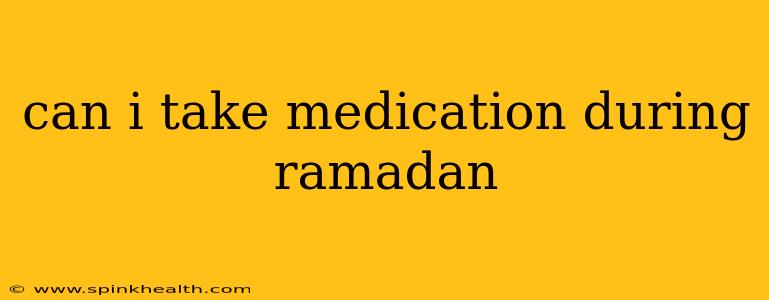Can I Take Medication During Ramadan? Navigating Faith and Health
Ramadan, the holy month of fasting for Muslims worldwide, is a time of spiritual reflection, prayer, and community. However, for many individuals, managing health conditions alongside the fast presents a complex challenge. The question, "Can I take medication during Ramadan?" is a crucial one, demanding careful consideration and potentially, consultation with both a religious scholar and a healthcare professional.
This isn't a simple yes or no answer. The permissibility of taking medication during Ramadan hinges on several factors, making it vital to approach this with nuance and understanding.
What does Islamic scholarship say about taking medication during Ramadan?
Islamic jurisprudence recognizes the importance of preserving one's health. The core principle of fasting is abstaining from food and drink from dawn (Fajr) until sunset (Maghrib). However, consuming medication necessary to maintain health is generally considered permissible, even during fasting hours. The reasoning lies in the principle of darura (necessity), which allows for exceptions to religious obligations when life or health is at stake. This principle is widely accepted among various schools of Islamic thought.
What types of medication are permissible during Ramadan?
Almost all essential medications, regardless of their administration method (oral, injection, inhaler etc.) are generally considered permissible if their intake is vital for health maintenance. This includes:
- Life-saving medications: Medications required to treat conditions like diabetes, heart disease, epilepsy, or other serious illnesses that could lead to severe health consequences without consistent treatment.
- Chronic illness medications: Medications for conditions like asthma, high blood pressure, thyroid issues, etc. Consistent medication is crucial for managing these conditions.
- Mental health medications: Medications for conditions such as depression, anxiety or schizophrenia are also permissible. Discontinuing these medications can have severe repercussions on one's well-being.
- Pain relievers: If pain is debilitating and impacts daily life, taking necessary medication is usually allowed.
What if my medication breaks my fast? Does it invalidate my fast?
Taking medication that requires breaking the fast, such as oral medication or injections, does not invalidate the fast according to the vast majority of Islamic scholars. The intention behind fasting remains paramount. If medication intake is out of necessity for maintaining health, then the act of taking the medication is not considered to break the fast.
How should I approach taking medication during Ramadan?
- Consult your doctor: Discuss your medications and their impact on your health with your physician. They can advise you on the best way to manage your condition during Ramadan, including the timing of medication intake.
- Consult a religious scholar: Seek guidance from a knowledgeable Islamic scholar or imam to address any remaining religious concerns about taking medication while fasting.
- Inform those around you: Keep your family, friends, and colleagues informed about your medication regimen to ensure you receive necessary support.
Are there any medications that are not permissible during Ramadan?
While most necessary medications are allowed, it's important to note that medications taken for non-essential reasons (such as cosmetics or enhancement) would not be permissible during Ramadan.
Can I adjust my medication schedule during Ramadan?
You may, in consultation with your doctor, be able to adjust the timing of your medication to minimize disruption to the fast. However, never alter your medication regime without medical advice, as this could negatively impact your health.
Ultimately, the decision of whether or not to take medication during Ramadan requires a balanced approach that considers both religious obligations and health needs. Open communication with both medical and religious professionals is key to making informed decisions that ensure both your spiritual well-being and physical health are maintained throughout the holy month. Remember, prioritizing your health, especially when you have pre-existing conditions, is of utmost importance.

